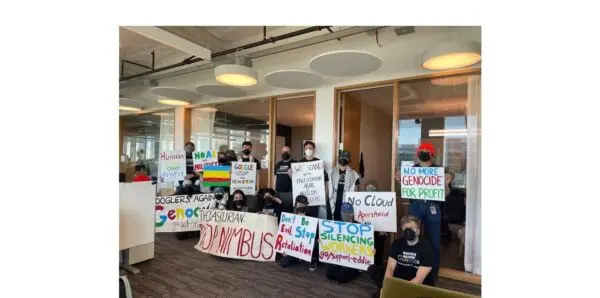Politics in the Workplace: No Talking?
Google’s CEO tries to zip the lips of employees
One day after firing employees who staged a sit-in at Google offices, CEO Sundar Pichai on April 18, 2024, went a step further, saying in a blog post that the company isn’t a place to “fight over disruptive issues or debate politics.”
Before stifling political exchanges, chief executives should ask whether their corporate culture encourages disagreements of all sorts, not just hot-button political issues.
“If your instinctive answer is to ban political discussion, then we’d suggest asking a different question: How can we support employees and encourage them to handle differences, respect one another, listen, and learn?” two communication experts wrote in 2021 in the Harvard Business Review.
Experts and CEOs have long touted the value of vigorous debate and argument as crucial to fostering innovation and efficiency. Are companies with those cultures better suited to manage employees’ political differences?
Meanwhile, in an era when politics is increasingly intertwined with business, do companies that try to draw the line at politics threaten what Pichai called “the culture of vibrant, open discussion that enables us to create amazing products”? Or are politics, and the Israel-Hamas war specifically, different?
There are no easy answers to these questions. We have even more questions. But before we consider those, let’s take a close look at the Google employees’ protests to see what they tell us about the thorny issue of politics in the workplace.
The protests
The demonstrators demanded that the tech giant pull out of a nearly three-year-old, $1.2 billion contract to provide cloud computing to the Israeli government and military. The contract, called Project Nimbus, includes Amazon, which is a leader not just in retailing but also in providing computing services over the internet.
Pichai quickly condemned the Hamas attack on Oct. 7, 2023, one of 11 CEOs or companies to do so among the 15 largest U.S. companies, according to an analysis by Ragan Consulting Group.
Five days after the attack, about 400 employees of both Google and Amazon published a letter in The Guardian demanding their employers cancel the Nimbus contract and sever ties with the Israeli military.
The CEO of Google and parent company Alphabet later announced an $8 million contribution to relief efforts in Israel and Gaza. It was the second largest corporate donation after chipmaker Nvidia, with 3,300 employees in Israel, promised to raise $10 million by matching workers’ donations.
Support for that country’s military action has fallen since the Hamas attack, with just 36% approving now, compared with 50% approving in November, according to a Gallup survey released March 27. Fifty-five precent now disapprove.
The simmering unrest at Google boiled over on April 16, when workers staged sit-ins at company headquarters in Sunnyvale, Calif., and an office in New York. Nine employees were arrested.
The protestors “physically impeded the work” of colleagues and “made coworkers feel threatened,” the company said. The group behind the protests, No Tech for Apartheid, denied this in a statement issued after the protests. The group has protested Project Nimbus since 2021.
The day after the protests, the company fired 28 employees it said were involved. On April 18, at the end of a long blog post entitled, “Building for our AI future,” Pichai didn’t mention the protests or firings, but closed with this:
“Ultimately, we are a workplace and our policies and expectations are clear: this is a business, and not a place to act in a way that disrupts coworkers or makes them feel unsafe, to attempt to use the company as a personal platform, or to fight over disruptive issues or debate politics.
(In 2019, the company banned political discussion on its internal mailing lists, a sign that Google employees are a rambunctious group.)
Since the initial firing, at least 20 more workers have been dismissed, the group organizing the protest said on April 23.
The questions
The whole affair raises several questions for which we have no quick answers.
1. When is discipline needed? The workplace is not a college campus. Yet even there we’re seeing university presidents’ patience run out. Google was justified in arresting and terminating employees who participated in the sit-in.
2. Who raised the issue? When a company takes a public stance the way Google has done, doesn’t it invite discussion among its employees?
Communication with employees is a key part of determining when, why and how the companies should take public positions under the DEPTH model proposed by two well-known DE&I experts, Janet M. Stovall and RCG affiliate consultant Kim Clark.
3. Will employees talk politics anyway? Sixty-one percent of workers have discussed politics at work over the past 12 months, according to a Nov. 2, 2023, survey by job site Glassdoor. While CEO discouragement will curtail such discussions, will it stop them? Will it create a snitch culture?
4. What do employees want? Some surveys suggest many workers don’t want to talk politics at work. For example, nearly half of workers say they would ban political discussions at work, according to the bi-annual CNBC-SurveyMonkey Workforce Survey of 5,993 workers released April 23. Younger workers are less likely to feel that way.
That’s a lot, but how many of those employees are comfortable having any difficult conversations at work?
In a survey of 6,000 employees at a Microsoft unit, 17.5% said they do not speak up to their managers at all, according to a 2020 report in the MIT Sloan Management Review. The largest group of employees (47.1%) said they speak up only on issues related to their jobs and not larger questions, such as corporate strategy or how employees are treated.
5. What’s next? In this era of polarized politics, some might think it’s unrealistic to ask employers to resolve these differences among workers when it seems no other institution can. Companies that don’t encourage disagreement on smaller matters might not want to start by tackling bigger issues.
But employers may have no choice. The result of discouraging employees from speaking up about politics and other topics outside of the job is “activism, discontent, and attrition,” according to the authors of the MIT Sloan article.
They say: “Encouraging employees to observe and speak up about areas of improvement across a variety of domains and ensuring that leaders listen and take action on this diversity of experience can help organizations thrive.”
Tom Corfman is a senior consultant at Ragan Consulting Group who believes that when emotions run high, patience runs low.
Does your organization and its employees need help navigating turbulent political waters? To learn more about how you can use the DEPTH model as a framework for tough conversations, contact us.
Contact our client team to learn more about how we can help you with your communications. Follow RCG on LinkedIn and subscribe to our weekly newsletter here.







